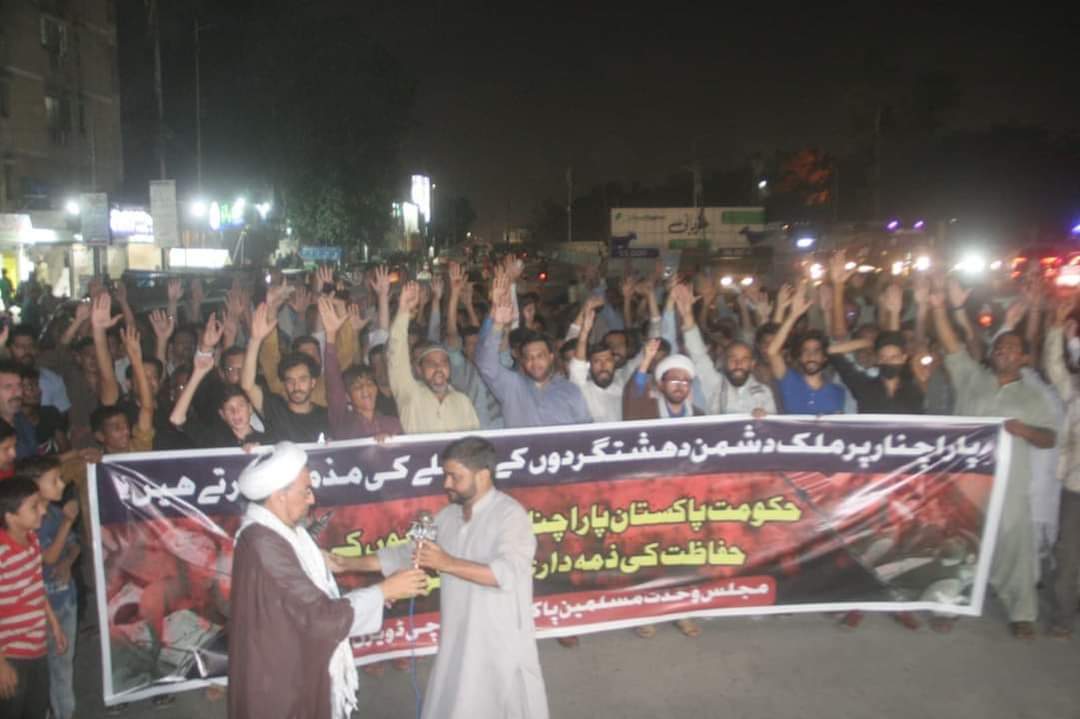

Pakistani Shias protest in Parachinar (Photo: Twitter)
The death toll in deadly clashes between Sunni and Shia tribes in Parachinar area of Khyber Pakhtunkhwa has risen to 11 with the injured at 67. Clashes erupted five days ago over a land dispute, creating a war-like situation in the region that borders Afghanistan.
Blocked roads due to the conflict have led to a shortage of food, medicines and fuel. Local Shias have blamed the banned Tehreek-e-Taliban Pakistan (TTP) as well as Sunni militants for blocking the only road that links the region to Peshawar, the capital of Khyber Pakhtunkhwa.
Due to the intense use of weapons, educational institutions, markets and offices have shut down. Despite ceasefire agreements between the warring tribes, clashes have spread as the ceasefire was violated by both the groups. Both Shias and Sunnis have used heavy weapons including missiles and rockets against each other in the clashes.
The Shia-Sunni conflict has been festering for decades over land disputes between the Turi, Bangash and Mengal tribes.
The Turi tribesmen are Shia while the Mengal are Sunnis. The Bangash tribe has, however, both Shias as well as Sunnis depending on where they reside in the Khurram Agency region.
Dawn reported that the residents of Parachinar blamed the Shehbaz Sharif government for not stopping terrorists from Afghanistan who broke the border fence and entered Pakistan. It quotes a local leader, Shabbir Sajid as saying that the handlers of the Afghan jihad wanted to create a safe zone for fighters who could be launched into Afghanistan. Sajid says that this was not a sect-based conflict but a pre-planned move by the Tehreek-e-Taliban Pakistan (TTP) and the rabid anti-Shia Lashkar-e-Jhangvi (LeJ) group to establish themselves in a Shia-dominated region.
The simmering competition for land between the Shias and the Sunnis was exacerbated by the TTP fighters who began to come back into Pakistan after having taken the seat of power in Kabul with the messy withdrawal of US and NATO troops. As the Pakistani Army had already began erecting the border fences, the TTP terrorists began breaking these to get into Parachinar and other areas of Khyber Pakhtunkhwa in 2021.
Issues came to the fore in May this year when a Sunni was killed in a targeted killing which led to the retaliatory killing of Shia school teachers spiraling resentment against the Sharif government.
The minority Shia community has been a target of Sunni majoritarian violence across Pakistan. Both groups – the TTP and the LeJ have been bombing and killing Pakistani Shias.
Parachinar has become a volatile mix of tribal, sectarian and terror competition. With a booming Shia population, Iran also sought to recruit poor Shia youth as fighters for its Zainabiyoun Brigade who were sent to Syria to support the Bashar-al-assad regime against the Sunnis and other global powers. Now the Pakistani government is apprehensive that the region has become a powder keg with the influx of all shades of battle-hardened terrorists from Syria and Afghanistan.
With the Parachinar situation getting out of hand, and roasted by Shia leaders for ignoring the volatile situation, Federal Minister for Overseas Pakistanis and Human Resource Development Sajid Hussain Turi said he specially returned to his home district to calm down the situation, adding: “We will soon restore peace in the area and armed forces will be posted in the war zones”.
This would mean additional deployment of Pakistani forces across the country where the uniformed personnel are already stretched out in Balochistan, Khyber Pakhtunkhwa as well as Sindh.
It is not just the Shias who are critical of the Sharif government.
The Human Rights Commission of Pakistan (HRCP) feels that little has been done to quell the explosive situation. It also highlighted that the sectarian clashes have curtailed the movement of the Shia community. The HRCP said: “There are also alarming reports of rising militancy feeding into local conflicts. The government must immediately undertake to resolve all sectarian differences peacefully and restore law and order to this region”.
Minister for Electronics and Information Technology Ashwini Vaishnaw said on Friday that the government is…
Renowned human rights activist and political analyst Amjad Ayub Mirza has expressed a strong denunciation…
As was widely expected, the Indian economy grew by 6.5 per cent in real terms…
World No Tobacco Day, marked annually on 31 May, addresses a major public health challenge--the…
Defence Minister Rajnath Singh, addressing officers and sailors onboard India's first indigenous aircraft carrier INS…
The leadership team from the Central Tibetan Administration (CTA) arrived in Tokyo to participate in…